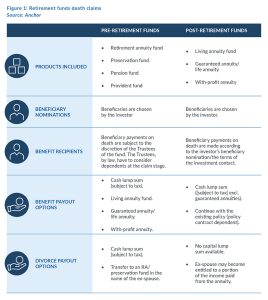Death comes unexpectedly to us all. For the family left behind, there are always unanswered questions and immediate concerns to be dealt with. At such a time of grief, claiming money from retirement funds can be daunting for the deceased’s family, as a wide variety of retirement funds are available for investors within SA. An investor may have any combination of these products through their retirement planning, and the claims processes differ for each. This can be confusing and concerning for the family trying to access the money. This article will endeavour to assist you in understanding the various retirement funds available and how the death claims process works for each.
In simple terms, retirement funds can be broken down into two main categories:
- Pre-retirement funds: These funds include retirement annuities (RAs), preservation, pension, and provident funds. These funds are the vehicles used to build up retirement savings over time.
- Post-retirement funds: These funds pay you an income at retirement and are generally known as annuities. Post-retirement funds include living annuities, guaranteed annuities and with-profit annuities.
What payment options do I have?
Beneficiaries can select either a cash lump sum, an annuity, or a combination of both.
What about estate duty and tax?
The death benefits payable from pre- and post-retirement funds do not form part of the deceased member’s estate. This means that no estate duty is payable on the death benefits. However, tax is payable on any cash lump sum received according to the retirement table of the deceased member. Any amounts invested into an annuity are transferred entirely tax-free. The income drawn from the annuity is taxable as income in the hands of the beneficiary when it accrues.
Who gets the money on death?
Beneficiaries vs dependents
Both pre-and post-retirement funds allow investors to nominate beneficiaries on death. However, there is a major difference between the two types of funds regarding the nomination and payment of beneficiaries.
Pre-retirement funds
The Pension Funds Act governs all pre-retirement funds in SA. Death benefits are paid according to Section 37C of the Act. The Act requires the fund’s trustees to consider the interests of any dependent of the deceased. This may even be contrary to the wishes of the deceased. This means that even if the deceased nominated beneficiaries, the trustees must consider any dependents for possible payout (e.g., minor children, ex-spouses receiving maintenance, etc.). The trustees have the final say about who will receive the benefits and in what proportion.
Another important nuance is that the nominated beneficiaries of pre-retirement funds will only receive the benefits after it is established that the estate is solvent (i.e., there is enough money to settle liabilities). If there is a shortfall in the estate, the death benefit must first be used to settle the shortfall. Any remaining benefit will then be paid to beneficiaries.
Post-retirement funds
Post-retirement funds (e.g., living annuities) are treated differently to pre-retirement funds, as the Long-Term Insurance Act and the Income Tax Act govern these funds. On death, these funds will be paid out according to the beneficiaries nominated or according to the terms of the contract. No dependents are considered for receipt of any benefit. This obviously provides greater certainty as to who will receive the death benefits.
The table in Figure 1 below summarises the main differences between the two retirement fund types and how the death benefits are handled:

Death claims from any fund involve time delay, and a defined process will be in place to protect all parties involved. Your financial advisor should be able to help you navigate the claims process and avoid any unnecessary delays and hassles along the way.
Disclaimer: The contents of this article are for information purposes only, and the accuracy, completeness, timeliness, or correct sequencing of any of the information contained herein cannot be guaranteed and should thus not be construed as investment advice. Readers should, therefore, only act after consulting their financial advisor.




